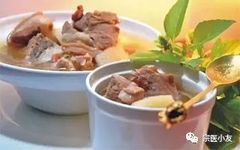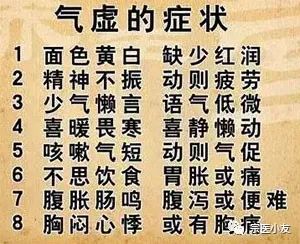
In Traditional Chinese Medicine (TCM), “Qi” refers to the extremely subtle substance that is highly active and continuously moving within the human body, serving as the fundamental material that constitutes and sustains life activities. Qi deficiency can be categorized into several types: Lung Qi deficiency (Fei Qi Xu), Kidney Qi deficiency (Shen Qi Xu), Spleen Qi deficiency (Pi Qi Xu), Heart Qi deficiency (Xin Qi Xu), and Yang Qi deficiency (Yang Qi Xu). Each type of Qi deficiency presents specific symptoms, which can help individuals determine their own condition.
① Lung Qi Deficiency (Fei Qi Xu): Individuals with Lung Qi deficiency typically exhibit symptoms such as frequent coughing and shortness of breath, feeling breathless even with slight exertion, and having a weak voice. They may also experience frequent colds, localized edema, and difficulty urinating.
② Kidney Qi Deficiency (Shen Qi Xu): Common symptoms of Kidney Qi deficiency include general fatigue, lower back pain, frequent dizziness, and forgetfulness. This condition indicates that the kidneys are unable to retain Qi, leading to a sensation of breathlessness and weakness.
③ Spleen Qi Deficiency (Pi Qi Xu): Symptoms of Spleen Qi deficiency are often more pronounced in appetite, where individuals may feel full after only a small amount of food, yet their bodies remain weak and lacking energy.
④ Heart Qi Deficiency (Xin Qi Xu): Those with Heart Qi deficiency may have a weak heartbeat. The heart acts as a pump for blood circulation; similarly, a weak heart leads to a general state of weakness.
⑤ Yang Qi Deficiency (Yang Qi Xu): Symptoms of Yang Qi deficiency include a sensation of coldness, cold extremities, low energy, and fatigue.
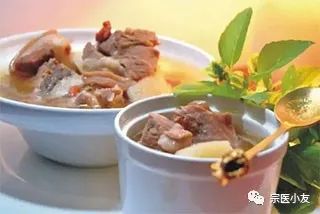
Dietary Remedies for Qi Deficiency:
Liu Weizhong’s Astragalus (Huang Qi) and Pig’s Foot Soup (Huang Qi Zhu Ti Tang):
Effects of Huang Qi Zhu Ti Tang: Huang Qi is known in TCM for tonifying the spleen and enhancing Spleen Qi. It is particularly effective for individuals with exterior deficiency and excessive sweating.
① Promotes lactation: Combine Huang Qi, Tong Cao, and pig’s foot to make soup, consuming both the meat and broth.
② Alleviates nausea from chemotherapy and radiotherapy: Combine Huang Qi, Ci Wu Jia, and pig’s foot to make soup, consuming both the meat and broth.
③ Helps reduce nausea and low protein levels, and provides supportive treatment for thrombocytopenia, especially in cases of anemia.
④ Aids in the rapid recovery of wounds or post-surgical healing of nerves, blood vessels, and soft tissues.
Ingredients: One pig’s foot (650 grams), 30 grams of Huang Qi, 10 grams of Dang Gui, 3 large red dates (or 5 smaller ones), 3-5 slices of ginger, 30 milliliters of yellow wine, salt, and pepper to taste.
Preparation:
1. Clean and cut the pig’s foot into pieces, submerge in water, add 10 milliliters of yellow wine, and boil for 10 minutes. Immediately transfer to cold water to remove impurities and odor. This step ensures the pig’s foot has a good texture.
2. In an electric pressure cooker, add enough water to cover the pig’s foot, along with all ingredients except salt. Add 20 milliliters of yellow wine. I used a pressure cooker today for convenience, but typically, I simmer it in a pot for an hour. After cooking, do not open the pressure valve; allow it to depressurize naturally, then add salt and simmer for an additional 5 minutes without pressure.
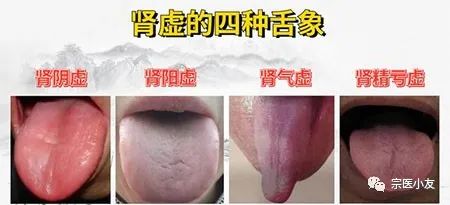
Four Tongue Signs of Kidney Deficiency (Shen Xu Tongue Signs):
Chinese Patent Medicines for Kidney Yang Deficiency: Gui Fu Di Huang Wan, Fu Zi Li Zhong Wan, You Gui Wan, Jin Gui Shen Qi Wan, Si Shen Wan, Qing E Wan, Ji Sheng Shen Qi Wan, etc.
Chinese Patent Medicines for Kidney Yin Deficiency: Liu Wei Di Huang Wan, Zhi Bai Di Huang Wan, Zuo Gui Wan, Mai Wei Di Huang Wan, He Che Da Zao Wan, Qi Ju Di Huang Wan, etc.
Chinese Patent Medicines for Kidney Qi Deficiency: Jin Gui Shen Qi Wan, Qi Wei Du Qi Wan, You Gui Wan, Ji Sheng Shen Qi Wan, etc.
Chinese Patent Medicines for Kidney Essence Deficiency: Wu Zi Yan Zong Wan.
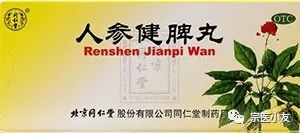
10 Types of Qi-Boosting Chinese Patent Medicines for Qi Deficiency:
1. Ren Shen Jian Pi Wan: Tonifies Qi and strengthens the spleen, nourishing the spleen and stomach, often chosen for individuals with thin body types, used for digestive issues due to Spleen Qi deficiency, such as poor appetite, chest tightness, abdominal distension, nausea, vomiting, abdominal pain, diarrhea, and frequent illness.
2. Ren Shen Gui Pi Wan: Tonifies Qi and nourishes blood, strengthens the spleen, often chosen for those with pale complexion and insomnia, used for heart and spleen deficiency leading to palpitations, insomnia with vivid dreams, forgetfulness, pale complexion, and bleeding gums or blood in stools.
3. Huang Qi Granules: Tonifies Qi and expels toxins, often chosen for middle-aged and elderly individuals with Qi deficiency, used for excessive sweating, physical weakness, and slow-healing sores.
4. Wu Jia Shen He Jie Jing: Often chosen for Lung Qi deficiency, can tonify Lung Qi and nourish essence and blood, used for Qi depletion, lung deficiency cough, and post-illness weakness.
5. Si Jun Zi Granules: A foundational formula for Qi deficiency, with a balanced nature, suitable for the general population, used for Spleen Qi deficiency, poor appetite, and loose stools.
6. Liu Jun Zi Wan: For Qi deficiency with phlegm dampness, used for Spleen Qi weakness, low appetite, Qi deficiency with phlegm, abdominal distension, and loose stools.
7. Xiang Sha Liu Jun Wan: For Qi deficiency and Qi stagnation with phlegm dampness, used for Spleen deficiency with Qi stagnation, indigestion, belching, low appetite, abdominal fullness, and loose stools.
8. Bu Zhong Yi Qi Wan: Tonifies the middle and boosts Qi, elevating Yang. Often chosen for chronic loose stools, used for poor appetite, abdominal distension, and prolonged diarrhea, with caution for those with exterior cold or heat symptoms, overeating, and hypertension.
9. Shen Ling Bai Zhu Wan: Strengthens the spleen and boosts Qi, used for fatigue, poor appetite, and loose stools. Caution: Avoid in cases of diarrhea with constipation or a sensation of rectal heaviness.
10. Xi Yang Shen Lozenges: For both Qi and Yin deficiency, often chosen for dry mouth, used for Qi and Yin deficiency, elderly individuals with dry mouth, thirst, fatigue, and significant tiredness after climbing stairs or exercising, which does not improve with rest.
Note:
All the above Chinese patent medicines can treat Qi deficiency, but it is essential to distinguish between Kidney Yang deficiency and Kidney Yin deficiency to understand one’s constitution for optimal results.

